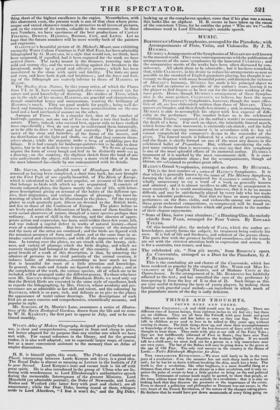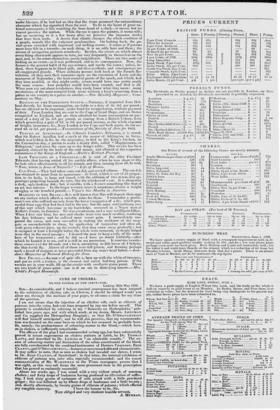THINGS AND THOUGHTS, FOUND HERE AND THERE.
MODERN CHILDREN.—A real child would now be a prodigy. There are different sizes of human beings, from eighteen inches to six feet six ; but there are no children. They are all born like Falstaff, with grey heads and great bellies, and are dandies and fine ladies as soon as they can lisp. We never talk to children as we used to love to be talked to fifty years ago, without coming to shame. The little things draw up, and show their accomplishments or knowledge of the world, in lieu of the bon-bonnerie of fancy with which we thought to treat them. They smile with pity at our talk of the Fairy Tales ; they are but indifferently informed of Puss in Boots; they have seen Tom Thumb at the play ; they have forgotten the Arabian Nights. If we would talk to a child now, we must look out for a person in a wig somewhere near our own years. The last of the Babies will soon be going down to the grave at the age of Old Parr. The only real nursery in the country is the House of Lords.— Tait's Edinburgh Magazine for June.
THE THREATENED REVOLUTION.—We were said lately to be in the very jaws of a revolution : if so, the monster has not such sharp teeth as has been said ; for he has let us down without breaking the skin, much less a bone. The truth is, that a revolution, like other bugbears, is a more dreadful thing at a distance than close at hand : we are always in a slow revolution, and it only re- quires the pulse of events to beat a little quicker to bring on the real political fever. Testimonies of various kinds might be quoted, to show that people, at the time, seldom know that they are actually in a revolution: that it is only on looking back that they discover the greatness or the importance of the event. Even so shrewd a politician and philosopher as Dumont was not aware, in the very heart of the French Revolution, of the nature of the changes taking place. Be declares that he would have put down memoranda of every thing going on 'ander his eyes, if he had had an idea that the times possessed the extraordinary character which has signalized them for ever. To be in the heart of great na- tional movements, is like watching the hour-hand of a clock-it moves, but we cannot perceive the motion. While the eye is upon the pointer, it seems still ; but on recurring to it a few hours after, we perceive the immense strides that have been made. A decree that silently changes the whole condition of a people, sounds like the vulgarest proclamation. On looking back, the pe- riod seems crowded with important and striking events : it seems as if persons must have felt in a tornado-no such thing, it is an eddy here and there ; the stream of occupation proceeds noiselessly. Besides, the events on which almost every thing afterwards appears to turn, are very frequently in themselves on the spot, and, to the actors themselves, nearly insignificant. There are two modes of looking on an event-as it was performed, and in its consequences. Now, the
i
former is the general habit of the eye-witness, and rarely the latter ; unless, in- deed, there happens to be blood spilt, and then accidents and consequences are all exaggerated grossly. When ordinary persons look back at the French Re- volution, all they turn their memories upon are the execution of Louis and the massacres of September ; the least essential points of the epoch, and which, had they been avoided, as they might easily, events would have run pretty nearly the same course. Less prejudice would have been created, and that is all. When men cry out about revolutions, they rarely know what they mean: many revolutions, of the most essential kind, occur without a king's removing from a palace in one country to a palace in another.-New Monthly Magazine; Com- mentary on May.
RESULTS OF THE PROTECTIVE SYSTEM.-Nttoriegs, if imported from Hol- land directly for home consumption, are liable to a duty of 3s. 6d. per pound ; but are allowed to he imported, under bond for reexportation, without payment of duty. From London they are sent to the Cape of Good Hope, and are thence reimported to England, and arc then admitted for home consumption on pay- ment of a duty of 2s. fid. per pound, as coining from a British Colony, from which proceeding a gain of 7d. or 8d. per pound accrues, as the whole expenses of freight, insurance, Sze., from London to the Cape and back again, do not ex- ceed 4d. or 5d. per pound.- Transactions of the-Society of Arts for 1831.
TENURE or ADDINGTON.-In Gibson's Camden's Britannia, it is stated, that Sir Robert Aguillon had a castle at the manor of Addington in Sorry, which was holden in fee, by the sergeantcy, to find in the King's kitchen, on the Coronation-day, a person to notice a dainty dish, called " Mapigernoun, or Dillegrout," and serve the same up to the King's table. This service has be m regularly claimed by the lords of the said manor, and allowed at the rapective coronations of the Kings of England.-Barkes Extinct Peerage.
LAST THOUGHTS OF A CHRISTIAN.-II is said of the elder President Edwards, th,at having settled all his earthly affairs, when he was about to die, he bade adieu affectionately to all his friends, and then, turning from all, he said, "Now, where is Jesus of Nazareth ? "-Life of Bruen.
CAT-F1SH.-Tbey had taken some cat-fish and several salmon. The cat-fish ilas obtained its name from its appearance : its head, which is out of all propor- tion to its body, is large and round, with the addition of two worm-like ap- pendages projecting beneath the eyes, like the whiskers of a cat. It is alto.,;ether a dark, ugly-looking fish ; but is eatable, with a flavour something like that of an eel, but inferior. In the larger western rivers it sometimes attains a weight of eighty or one hundred pounds.- Vigne's Months in America. MAGGOTS IN THE BRAIN.-It is well known that flies will deposit their eggs on any surface which affords a suitable nidus for them. I remember a gentle- man's son who suffered severely from the larvae (maggots) of a fly, which pro- ceeded from eggs that had been laid in the ear; but the most extraordinary case of this sort which has come to may knowledge, occurred in a Negro man at Kellitt's Estate, in Jamaica. He was a tradesman, and a very intelligent fellow. When I first saw hint, his nose and cheeks were very much swollen, rendering his face hideous ; and he suflbred most severe pain. I immediately sus- pected the cause, and soon succeeded in making the residence of the mag- gots so uncomfortable to them, by application of turpentine and olive oil, with green tobacco juice, up the nostrils, that they mine away gradually ; but it occupied at least a fortnight before the whole were removed, so deeply lodged were they in the nasal passages. I desired the man to keep a tally of the num- bers of his tormentors; and he did so-I have no doubt faithfully-after which be handed it to me, and it is still in my possession. It contains twenty- three crosses (x) for 10 each, and v fbr5, amounting to 235 larvae of, I believe, the blue-bottle fly. Ahnost all of them were full grown, and forming perhaps such a brood of maggots its never proceeded from any luau's head before.-Lou don's Magazine of Natural History for June.
BUG POISON.-An ounce of quit' silv.r, beat up with the White of two eggs, and put on with a featlwr' is the cleanest and surest bed-hug poison. If the vermin are in your walls, fill up the cracks with verdigris green paint. There are two kinds of green paint : one is of no use in destroying insects.-Mrs. Child's Frugal Housewife.



























 Previous page
Previous page